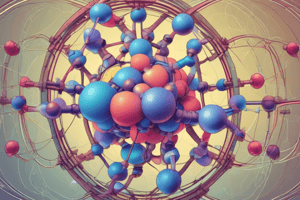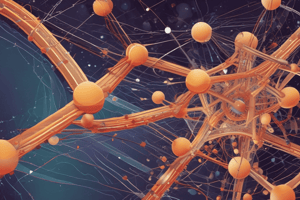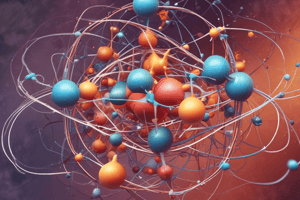Podcast
Questions and Answers
What is the definition of matter?
What is the definition of matter?
- Anything that has volume and occupies space
- Anything that has mass and occupies space (correct)
- Anything that has color and occupies space
- Anything that has weight and occupies space
What is the ratio of mass to volume called?
What is the ratio of mass to volume called?
- Toxicity
- Density (correct)
- Reactivity
- Flammability
What state of matter has particles that are closely packed and have a fixed shape?
What state of matter has particles that are closely packed and have a fixed shape?
- Gas
- Solid (correct)
- Liquid
- Plasma
What is the process called when a solid changes directly to a gas?
What is the process called when a solid changes directly to a gas?
What is a mixture of two or more substances that can be separated by physical means?
What is a mixture of two or more substances that can be separated by physical means?
What is the state of matter where atoms are ionized and have a high energy?
What is the state of matter where atoms are ionized and have a high energy?
Flashcards are hidden until you start studying
Study Notes
Definition of Matter
- Matter is anything that has mass and occupies space.
- It is the physical substance that makes up all objects, including living things, rocks, and gases.
Properties of Matter
- Physical Properties:
- Mass: a measure of the amount of matter in an object
- Volume: the amount of space occupied by an object
- Density: the ratio of mass to volume
- Chemical Properties:
- Reactivity: the ability of a substance to undergo chemical reactions
- Flammability: the ability of a substance to catch fire
- Toxicity: the degree to which a substance can cause harm
States of Matter
- Solid:
- Particles are closely packed and have a fixed shape
- Examples: rocks, metals, and ice
- Liquid:
- Particles are close together but can flow
- Examples: water, oil, and juice
- Gas:
- Particles are widely spaced and can expand freely
- Examples: air, helium, and oxygen
- ** Plasma**:
- A high-energy state where atoms are ionized
- Examples: stars, lightning, and neon signs
Changes of State
- Melting: solid → liquid
- Freezing: liquid → solid
- Evaporation: liquid → gas
- Condensation: gas → liquid
- Sublimation: solid → gas (e.g., dry ice)
- Deposition: gas → solid (e.g., frost)
Mixtures and Pure Substances
- Mixture: a combination of two or more substances that can be separated by physical means
- Pure Substance: a substance that has a fixed composition and properties
- Examples: water, gold, and sugar
Studying That Suits You
Use AI to generate personalized quizzes and flashcards to suit your learning preferences.




